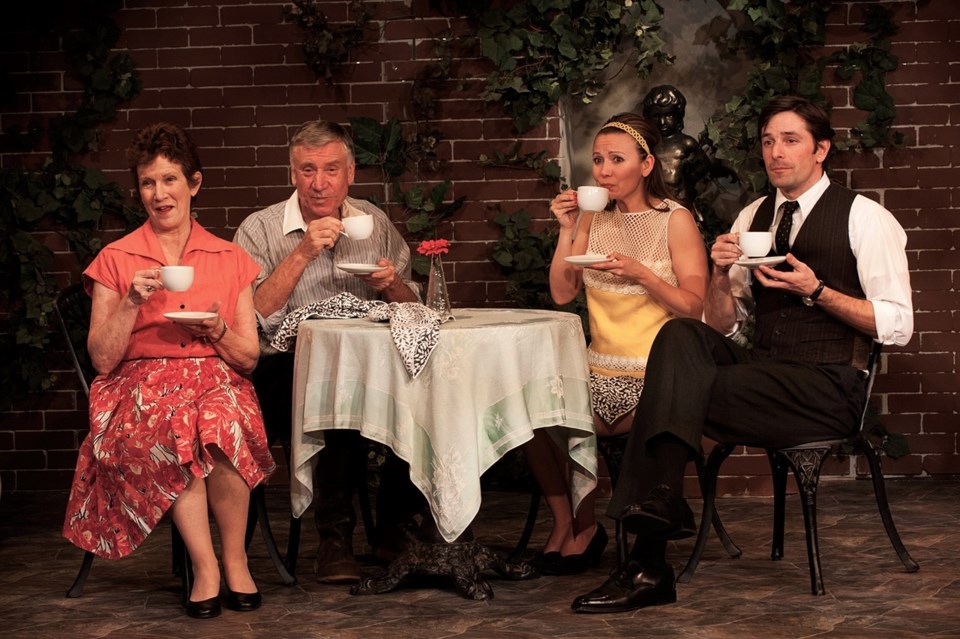Relatively Speaking
At Performing Arts Lodge (PAL) until Dec. 1
brownpapertickets.com
It seems only yesterday that Alan Ayckbourn was a hot new playwright writing scathing but hilarious plays about marriage, infidelity and the British middle class. But some of those early plays (Ayckbourn has written more than 70 full-length plays since 1959) haven’t aged particularly well, and Relatively Speaking is at that awkward age: written in the mid-’60s, it’s not really old enough to be considered “period” and not recent enough to be “contemporary.” It’s worth considering, however, that the premiere performance of this play at the Scarborough Library Theatre was a massive success even earning Ayckbourn a congratulatory telegram from Noel Coward. And it’s also possible that Ayckbourn’s huge success spawned — and continues to spawn — so many similar plays and TV sitcoms that we’re immune to his considerable skill. Mistaken identity, unfounded jealousy, and infidelity suspected or actual, all leading eventually to happy but highly suspicious resolution — happily never after. We feel we’ve heard and seen it all before.
Nevertheless, this Western Gold Theatre production played to an appreciative full house the weeknight I attended. There was lots of laughter and a happy buzz after the curtain came down.
The best part of this production is seeing real life couple Anna Hagan and Terence Kelly together on stage as an old married couple. There’s such ease between them as well as many, many years of experience on stage, TV and film; true professionals, they jointly won the Jessie Award for Career Achievement in 2013. As Sheila and Phillip in Relatively Speaking, their comfort with each other as well as their natural spark and wit have huge payoffs.
Phillip suspects Sheila of having an affair, which she isn’t; Sheila does not, perhaps, suspect Phillip of having an affair, which he is. Or maybe she does and is holding it as a wildcard to play against him sometime. She’s wicked; he’s hapless.
The other couple is Ginny (Stacie Steadman) and Greg (Jay Hindle). They’re much younger, not married, but already have problems: Greg suspects Ginny is still carrying on a relationship with an older, married man. When Ginny says she’s going away for the weekend to visit her parents, Greg is suspicious and decides to check it out. She’s actually going to visit that older, married man to break it off. And you can guess who that older, married man is.
That’s the setup and it leads to all sorts of silly shenanigans. In true Ayckbourn fashion it all ends up sort-of-but-not-really happily. These couples are stuck with each other ‘til death do them part.
Steadman and Hindle are nicely matched as a couple who met only a month ago but who are already considering marriage. The characters are flat: we know next to nothing about them so we don’t really care whether they sort themselves out or not.
Possibly because of the magnetism and charm of Hagan and Kelly, we have hopes for Sheila and Phillip, but whatever happens on this fateful weekend when they all end up together, this couple will endure: they love the cat-and-mouse game they play with each other.
Anthony Ingram directs this foursome on Glenn MacDonald’s all-purpose set: a London flat hung with laundry in Act 1 that transforms into a beautiful brick-walled, sunlit patio bedecked with vines, flowers and an alcove complete with cherub in Act 2.
The question always arises with Ayckbourn about how autobiographical his plays are. His first marriage ended when he became involved with an actress many years his junior (whom he subsequently married), followed by another affair with yet another actress. The outcome of this mess was that when he was knighted in 1997 both his first wife and his second wife became entitled to be called “Lady Ayckbourn.”
Sounds like a British middle class farce, doesn’t it?
For more reviews, go to joledingham.ca.


